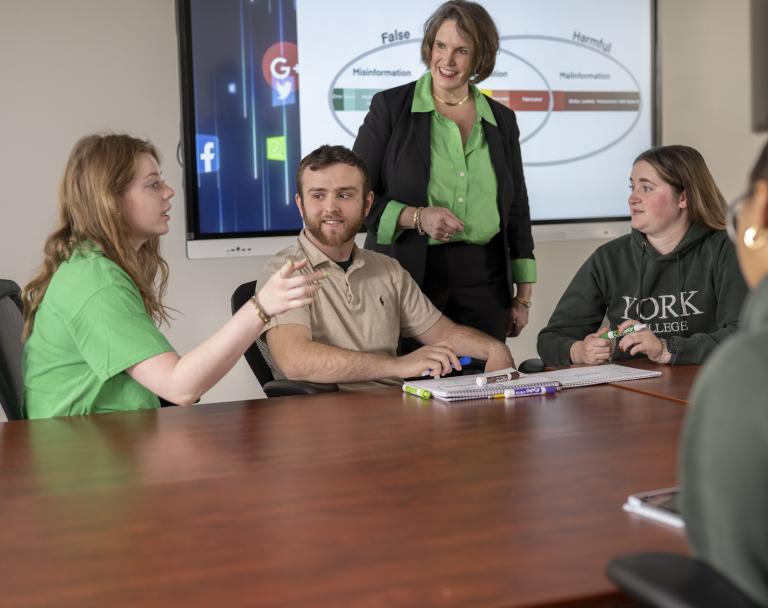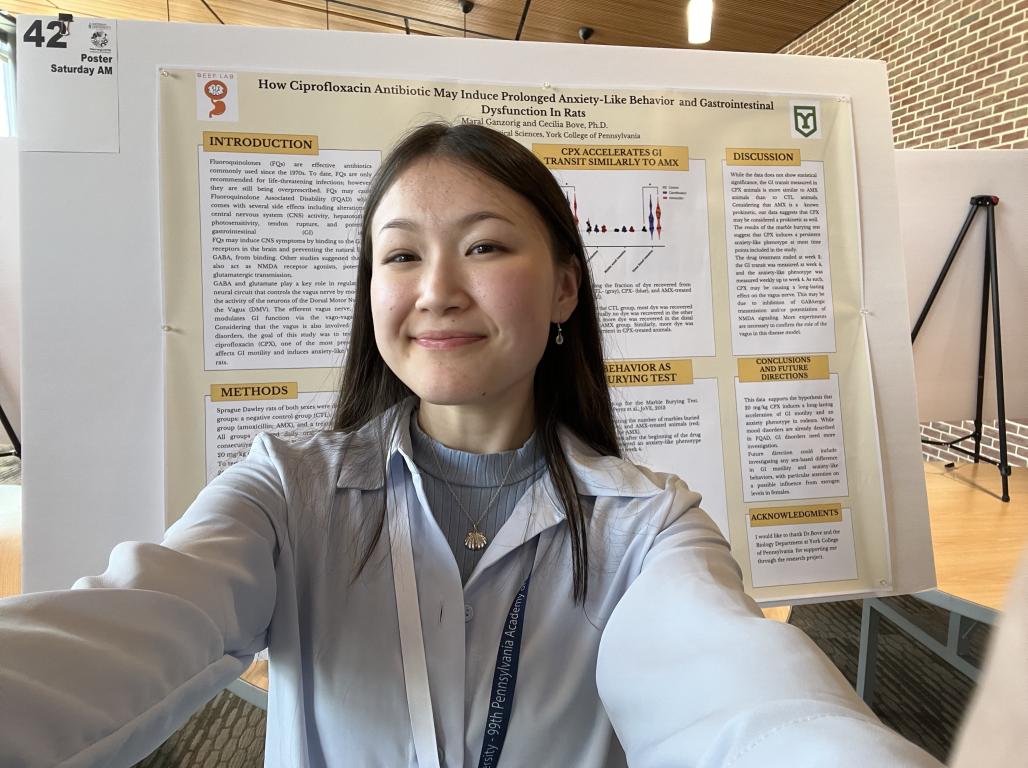The Associate Professor of Cybersecurity and Strategy recently published “Information Warfare,” a book about what’s true and what isn’t.
In September, Tamara Schwartz, Doctor of Business Administration and Associate Professor of Cybersecurity and Strategy at York College of Pennsylvania, published a textbook for her “Information and Disinformation Literacy” course. Titled Information Warfare: An Introduction to Information and Disinformation Literacy, the book is a comprehensive guide for students navigating the complex landscape of information in the digital age.
Dr. Schwartz possesses a unique combination of military expertise, academic rigor, and a passion for the human element in technology. With a doctoral degree and a U.S. Air Force background deeply rooted in cybersecurity, she brings a wealth of experience to her role as an educator and thought leader.
From Air Force to Academia
In 2011, Dr. Schwartz was recognized as the Air Force’s Information Operations Officer of the Year at her four-star command. Her experiences in the Middle East and around the world exposed her to the strategic importance of information in shaping narratives and influencing decision-making.
“When we were standing up U.S. Cyber Command, we talked about how the ultimate hack was not the attack that shuts down the networks, but one that impacts how people make decisions and understand the world around them,” Dr. Schwartz says. “A network hack can slow decision-making by limiting access to data, but an attack on what people believe and know is much worse.”
Transitioning into academia after retiring from the military, she helped develop York College’s Cybersecurity Management program from the ground up.
“When we were designing the curriculum, I said we need to address the use of the information environment to manipulate people,” she says.
She proposed a course in 2018 that went beyond traditional cybersecurity education. She envisioned a curriculum that delved into information and disinformation literacy.
In 2020, the COVID-19 pandemic hit, quickly followed by a raucous presidential election, upheaval in the nation, and the attack on the U.S. Capitol on January 6, 2021. Two weeks later, the new course had its first contingent of students walk through the classroom doors.
“The students came in wanting answers,” Dr. Schwartz says. “They understood this was a class that would help them understand the world in a way they didn’t previously.”
Relevance Across Disciplines
The course, initially designed for Cybersecurity Management majors, quickly gained relevance beyond the cybersecurity realm and found its place in the general Business Administration curriculum. Dr. Schwartz recognizes the necessity of equipping students across various disciplines with skills in information, disinformation, and media literacy. In an era when misinformation can have far-reaching consequences, cultivating these skills becomes crucial for professionals in any industry.
The significance of information literacy goes beyond the academic arena for Dr. Schwartz. A prevalence of disinformation can lead not only to mistrust of all information, but to mental health issues and empathy erosion. Information warfare extends beyond influencing decisions; it shapes the way individuals perceive the world and one another.
“If there’s enough bad information, people start to doubt good information and not believe anything that’s out there,” Dr. Schwartz says.
When it comes to events such as the 2024 presidential election, attention capture is the name of the information game. Groups often get that attention by inciting fear or presenting novelty, Dr. Schwartz says. These two methods play a pivotal role in shaping political and other decision-influencing narratives. She has seen the detrimental effects of fear on decision-making, where it becomes difficult for individuals to process important information objectively.
For her, the key is to help her students learn how to truly listen to those who think differently.
“How do I listen to what someone else has to say? How do I problem-solve with someone who doesn’t think exactly how I do? There’s not a right or wrong way. There’s a lot of give-and-take with any way,” she says.
Building in Student Input
Dr. Schwartz didn’t work alone in developing her textbook. For several semesters, students actively contributed to its content, making it a dynamic and relevant resource. The uniqueness of Dr. Schwartz’s course and textbook lies in their focus on the human element amid the rise of artificial intelligence and other technologies. She developed the course to teach individuals how to navigate and harness technology for societal benefit. It’s not just about the technical aspects; it’s about understanding the human side of technology and fostering a society capable of working through differences.
“The tech isn’t going away,” she says. “We have to learn how to make it work for us.”
Dr. Schwartz stands at the forefront of a paradigm shift in education, addressing the challenges posed by information warfare in the digital age. Through her innovative course, she is shaping the next generation of professionals who will navigate the complexities of our information-driven world with a critical understanding of the power of information and disinformation.




